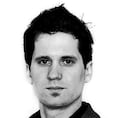Despite the recession, Irish men are spending more than ever on personal grooming
ACCORDING TO new research from the University of Aberdeen, more and more women are choosing feminine men over their more rugged and masculine counterparts. So, it’s a case of in with Orlando Bloom and out with Arnie, as the changing face of masculinity continues.
Some of the reasons given for the rise in demand for the woman’s man are improvements in healthcare and a general increase in male grooming. Six out of 10 women in Britain now prefer more feminine men, the report found.
“The results suggest that as healthcare improves, more masculine men fall out of favour,” says the report’s author, Dr Lisa DeBruine. “That could be why feminine-looking movie stars like Johnny Depp and Orlando Bloom are popular now compared with the likes of Clark Gable and Sean Connery in the past.”
While the recession has hit many high-end cosmetic and grooming outlets aimed at women, from nail bars to tanning studios, the share of the male market in grooming and cosmetics has increased.
Irish men are now more comfortable buying skincare products and the range and availability of moisturisers and facial creams for men has expanded significantly.
Cian McDonald, co-owner of the Grooming Rooms in Dublin, says that while Irish men have been somewhat slower to catch up with the grooming habits of their European counterparts, they are quickly making up for lost time.
“I think perhaps Irish men were a bit slower coming to the whole grooming market. The Italians and French are very well groomed and I think everyone wants to look well these days. You don’t have to sacrifice your sexuality for that.”
The Grooming Rooms has been open for two years and as well as barber services, it also offers massages, facials, manicures and pedicures for men. “We have a broad demographic coming in here,” says McDonald, “we get everyone from young guys to men in their 80s. To be honest, the recession hasn’t impacted that much.
“Men no longer see this type of service as a luxury. With facials and waxing, men are becoming more conscious of their skin and how they should look after it. Women have been doing it for generations and I don’t think there is any shame in men doing it either.”
But while males in Dublin may be upfront and open about their grooming habits, across the rest of the country are Irish men okay to move beyond a bar of soap and a splash of aftershave?
Former model turned restaurant owner Lee Bradshaw currently runs the Station House Bar and Grill in Tralee. For several years Lee was a successful model in Dublin, before moving to Kerry in 2004. “One thing I noticed from living in Kerry and then going back to Dublin is that the men in the capital are perhaps overly groomed. Some are out there with fake tans and eye lashes. I was away a few years and when I came back and went out in Dublin it felt like every man was groomed to the max, with three-piece suits and dyed eyebrows! Down here in Kerry you wouldn’t really find that. The guys are real men’s men.”
While the feminine man may be in more limited supply outside the urban centres, Bradshaw admits Irish men everywhere are far more image conscious. “I wouldn’t think there is any embarrassment for any man to buy moisturiser anymore. I think it’s a lot more common for men to have products like that in their bathroom. Irish men are taking care of themselves a lot better.”
One of the companies benefiting from the broadening of Irish masculinity is L’Oréal, which has an extended range of products for men now available everywhere from supermarkets to chemists. Some of its products include a ‘hydra-energetic eye care roll on’ designed to eliminate dark circles and eye bags under men’s eyes.
In the past two years the company’s share of the male cosmetic market in Ireland has risen from 7 per cent to 20 per cent and it expects growth to continue this year.
As a sign of its growing confidence in a receptive male audience for its products, L’Oréal last year became one of the sponsors of the Irish rugby team. “The male market is relatively small at the moment, but we expect to be significantly bigger in the future,” says Louise Horgan of L’Oréal Ireland.
“We are also convinced there will be a big male market in corrective cosmetics, but that is further down the road. We’re now selling in supermarkets and the products have specific areas of the store apart from the female sections.”
Another Irish man who has seen the changing face of masculinity is fashion stylist Brendan Marc Scully who believes well-groomed athletes have impacted hugely on the feminisation of Irish men. “It’s all down to David Beckham if you ask me. He started it off and made the metrosexual man far cooler. Irish men have come a long way but I think we are still a little off the British and European male.”
Scully says that while women may be in the market for a more feminine partner, they should be warned that vanity also comes as part of the modern male.
“I think in a way a lot of guys are more into themselves now. I know for a fact when I’m out, lots of heterosexual guys ask me for fashion tips on what they should wear or what products they should use. I’m not sure that would have happened a few years ago. Times have changed.”







